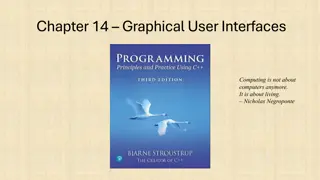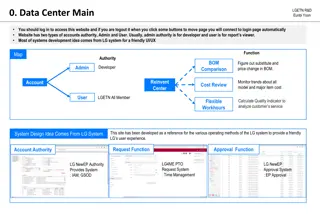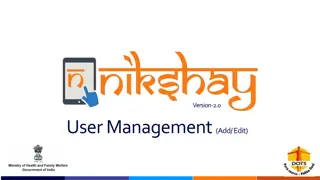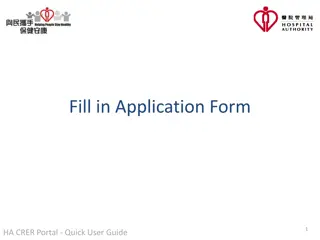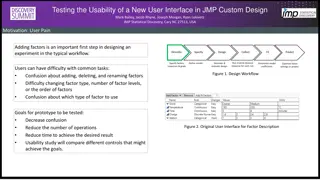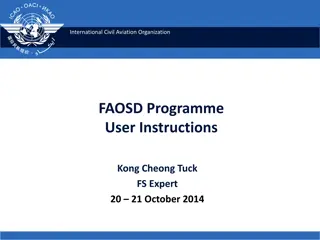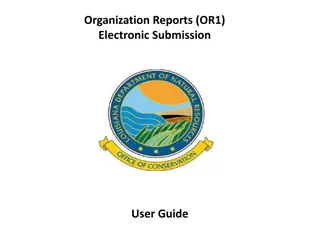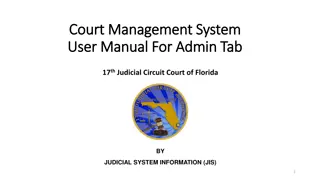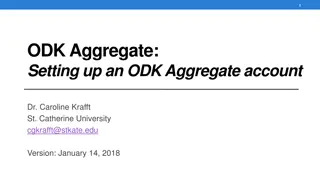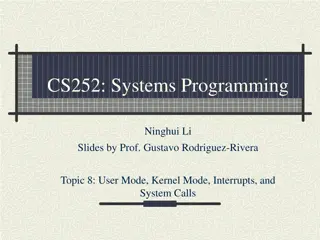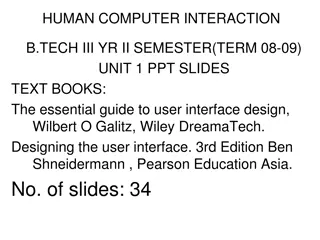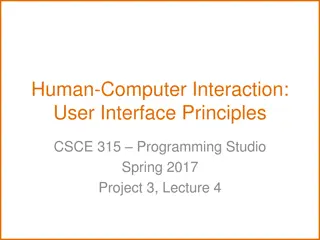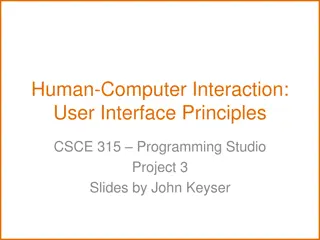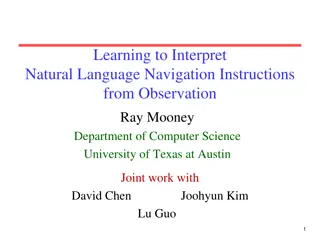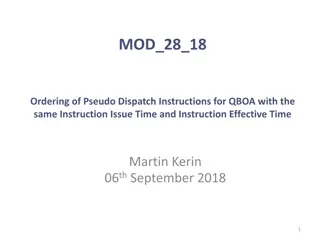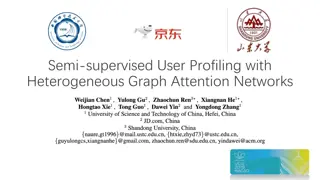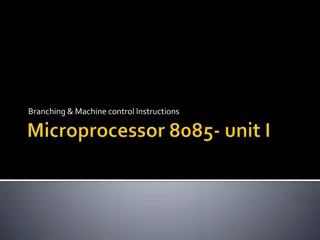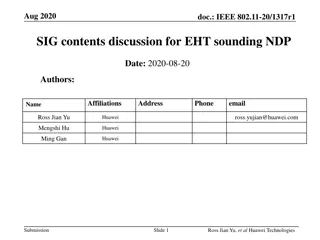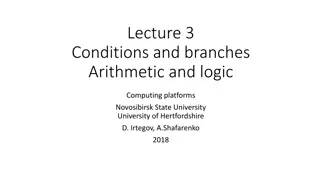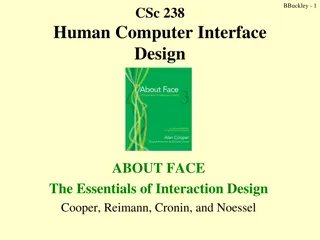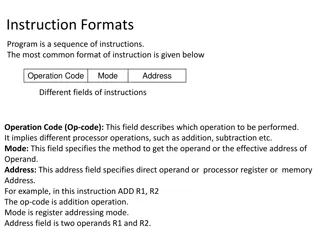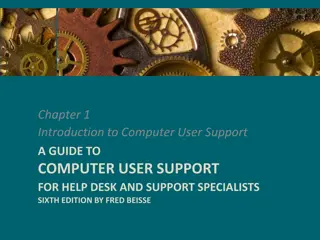Maximizing Impact: The Role of Rich Snippets in SERPs"User Intent
User intent, also known as search intent, refers to the underlying goal or purpose a user has when performing an online search. It goes beyond the literal interpretation of keywords and focuses on understanding why a person is searching. Recognizing and catering to user intent is crucial for creatin
3 views • 10 slides
Operating Systems
An operating system is a crucial program that manages all other programs on a computer. It handles tasks like input recognition, file management, and device control. There are different types of operating systems such as single-user, single-task systems, multi-user, multi-task systems, real-time ope
6 views • 11 slides
The Evolution of Graphical User Interfaces in Computing
Graphical User Interfaces (GUIs) have transformed computing into a more user-friendly and interactive experience, emphasizing the shift from technology-focused to human-centric living. This chapter delves into the various aspects of GUIs, including I/O alternatives, common GUI tasks, programming per
1 views • 32 slides
Implementing Alert Messages and User Input Handling in Java
This tutorial guides you through creating alert messages, handling user input, defining functions, calling functions from the `onCreate` method, and creating an XML file for user data entry validation in Java. Learn how to display alerts for empty user credentials and process user actions accordingl
1 views • 6 slides
LG System Reference for User Experience Enhancement
This website serves as a reference for LG system operating methods, focusing on UI/UX enhancement, system design, account management, and error handling. It offers user and admin authorities for different functionalities like data analysis, system monitoring, and account approval. Users can sign up
1 views • 15 slides
Unsupervised Clickstream Clustering for User Behavior Analysis
Understanding user behavior in online services is crucial for businesses. This research focuses on utilizing clickstream data to identify natural clusters of user behavior and extract meaningful insights at scale. By analyzing detailed user logs, the study aims to reveal hidden patterns in user inte
0 views • 19 slides
Introduction to Programming and Computer Instructions
Programming is the process of creating instructions for computers to follow and accomplish tasks. It involves turning human language instructions into detailed binary machine language. Before learning programming, individuals may have different levels of experience, ranging from no experience to pro
0 views • 16 slides
Domain-Specific Visual Analytics Systems: Exploring Expert User Insights
This presentation delves into domain-specific visual analytics systems focusing on political simulation, wire fraud detection, bridge maintenance, and more. It emphasizes leveraging user expertise for effective system design and evaluation, highlighting the importance of user insights in data analys
0 views • 27 slides
Efficient User Management System for Health Facilities
Record and manage user details effectively with the new Version 2.0 User Management feature. RNTCP has now registered over 35,000 PHIs, 140,000 Private Health Facilities, 15,000 Private Labs, 31,000 Private Chemists, across 700 Districts and 8,000 TUs in Nikshay. Enhance operations by editing TU pro
0 views • 26 slides
User Roles and Responsibilities Overview
The user roles within the application are categorized into Account Manager, Data Steward, and Common Functionality roles. Each role comes with specific responsibilities such as managing user accounts, database management, data stewardship, incident management, and more. Non-privileged roles provide
1 views • 11 slides
Quick User Guide for Fill-In Application Form on HA.CRER Portal
This Quick User Guide provides step-by-step instructions on how to fill in the application form on the HA.CRER Portal. It covers essential aspects such as mandatory fields, saving unfinished applications, transitioning to the draft stage, selecting clusters, acknowledging instructions, completing di
0 views • 12 slides
Agile User Stories in Software Development
Agile user stories play a crucial role in software development by providing short descriptions of features desired by customers in a language they understand. This method allows for agile planning, efficient documentation, and effective communication between development teams and clients. Extracting
0 views • 30 slides
Exploring Usability Testing of New Interface in JMP Custom Design
In this study by Mark Bailey et al. from JMP Statistical Discovery in the USA, the focus lies on testing the usability of a new user interface using JMP Custom Design. The researchers highlight the significance of adding factors in the initial experiment design workflow to enhance user experience. U
0 views • 8 slides
International Civil Aviation Organization FAOSD Programme User Instructions
Comprehensive user instructions for the FAOSD Programme provided by Kong Cheong Tuck, an FS Expert, on October 20-21, 2014. The content includes details on inspections, search functionalities, and exercises related to searching the aviation database with various filtering options. Visual aids and st
0 views • 7 slides
Online Submission User Guide for Louisiana Organization Reports
This user guide provides detailed instructions for electronic submission of organization reports (OR1) in Louisiana. It covers creating an account, initial filing, user types, and account activation process. The guide also includes information on different divisions and their respective forms for re
0 views • 18 slides
Guide to Court Management System User Administration
Learn how to effectively manage user profiles, create sub-user accounts for legal assistants, update user information, and create associates' accounts in the Court Management System for the 17th Judicial Circuit Court of Florida. Detailed instructions provided for changing usernames, passwords, and
0 views • 15 slides
Enhancing User Experience Through Data Trails and Metrics
Andrea Thompson, a Sr. User Experience Manager at The Home Depot, highlights the importance of measuring and analyzing user experience metrics to understand and improve customer interactions. By investigating data trails from various touchpoints, such as customer sign-ups, interactions with associat
0 views • 17 slides
Setting Up an ODK Aggregate Account: Step-by-Step Guide
This guide provides detailed steps on setting up an ODK Aggregate account, including options for deployment, installation instructions, user roles, and permissions. Learn how to manage collected data, deploy to Google's App Engine or a local server, and utilize different user capabilities within ODK
0 views • 11 slides
User Mode, Kernel Mode, Interrupts, and System Calls in Computer Architecture
In modern computers following Von Newman Architecture, programs and data are stored in RAM. The CPU, RAM, ROM, and devices communicate via address and data buses. The system operates in both kernel and user modes, where kernel mode allows full system control, while user mode restricts access for sec
0 views • 29 slides
Evolution of User Authentication Practices: Moving Beyond IP Filtering
The article explores the obsolescence of IP filtering in user authentication, highlighting the challenges posed by evolving technology and the limitations of IP-based authentication methods. It discusses the shift towards improving user experience and addressing security concerns by focusing on user
1 views • 22 slides
Introduction to Graphical User Interfaces (GUIs) in Python for Geographical Information Analysis
This content provides insights into creating Graphical User Interfaces (GUIs) in Python for Geographical Information Analysis. It covers the basics of GUI development using TkInter and event-based programming with a focus on user experience design and functionality. The lecture emphasizes the import
0 views • 45 slides
Importance of Human-Computer Interaction (HCI) in User Interface Design
Human-Computer Interaction (HCI) is a crucial discipline focusing on creating interactive computing systems that are user-friendly and efficient. This involves designing, evaluating, and implementing systems that cater to users' needs, ultimately improving user satisfaction and productivity. The fie
1 views • 39 slides
User Interface Design Principles in Human-Computer Interaction
User interface design principles are crucial in Human-Computer Interaction. This content highlights key principles such as aesthetics, anticipation, autonomy, and color consideration for users with color blindness. It emphasizes the importance of user testing, user autonomy, and providing essential
0 views • 24 slides
AUBMC SharePoint CMS 2016 User Manual
This comprehensive user manual covers step-by-step instructions for updating and managing a website using SharePoint CMS 2016 at the American University of Beirut Medical Center (AUBMC). It includes sections on SharePoint terminology, user roles/permissions, navigation, document management, site man
0 views • 22 slides
Principles of User Interface Design in Human-Computer Interaction
User interface design principles play a crucial role in Human-Computer Interaction, emphasizing the importance of aesthetics, anticipation, autonomy, color usage, and consistency in creating effective interfaces. These principles guide designers in crafting interfaces that are visually appealing, us
0 views • 24 slides
Enhancing User Experience Through Dynamic Recommendations
In this presentation, the xStreams system is introduced for recommending items to users with changing preferences. The methodology involves learning user preferences, finding similar users, and providing item recommendations. The motivation behind the system includes dealing with vast amounts of dat
0 views • 27 slides
Interaction Design in Human-Computer Interaction
Interaction design focuses on creating interactive products that are easy, effective, and enjoyable to use. It aims to reduce negative user experiences while enhancing positive ones. Designing interactive products requires understanding user activities, interfaces, and device arrangements to support
0 views • 11 slides
Enhancing Recipe Recommendations with C-KGAT Model
Introducing the Contrastive Knowledge Graph Attention Network (C-KGAT) for personalized recipe recommendation, addressing user preferences and noise in interactions. The model leverages a collaborative knowledge graph, user-recipe interactions, and textual features to recommend top-K recipes to user
0 views • 21 slides
Learning to Interpret Natural Language Navigation Instructions from Observation
This research focuses on developing a system that can interpret natural language navigation instructions by observing humans' actions in a virtual environment. The goal is to create virtual agents capable of understanding and following instructions in video games and educational software, all based
0 views • 51 slides
Ordering of Pseudo Dispatch Instructions for QBOA
This document outlines the specific order in which Pseudo Dispatch Instructions (DIs) are to be arranged for QBOA in scenarios where multiple instructions are issued simultaneously. The order prioritizes certain instructions to maintain consistency and alignment with system implementation rules.
0 views • 11 slides
Semi-Supervised User Profiling with Heterogeneous Graph Attention Networks
Utilizing heterogeneous graph attention networks, this study addresses the limitations of existing user profiling methods by integrating multiple data types and capturing rich interactions in user data. The approach tackles critical problems in representation learning, information propagation, and m
0 views • 15 slides
Branching and Machine Control Instructions
This content delves into the intricate details of branching and machine control instructions in programming. It explains the three main types of instructions - JUMP (JMP), CALL, and RETURN - along with their subtypes and functionalities. The unconditional and conditional aspects of JUMP, CALL, and R
0 views • 18 slides
IEEE 802.11-20/1317r1 EHT-SIG Proposal Discussion
The document discusses EHT-SIG for single-user and sounding NDP in IEEE 802.11-20/1317r1, focusing on overflow bits, user fields, CRC, and tail formats. It covers the format details, subfields, and overhead compared to HE sounding, proposing specific bit allocations for different elements. The EHT-S
0 views • 16 slides
Arithmetic and Logic Computing in CdM-8
Explore the fundamental concepts of arithmetic and logic computing, including conditions, branches, arithmetic instructions, logic instructions, shift and move instructions, and the practical applications of shift operations. Delve into CdM-8 flags semantics, C and unsigned subtraction/comparison, b
0 views • 14 slides
Administrator Deletes User - User Management System Storyboard
An administrator navigates through a user list, selects a user for deletion, confirms the action, and successfully removes the user from the system. The process involves interacting with user details, confirming the deletion, and updating the user list accordingly in a structured manner.
1 views • 4 slides
User Interface vs User Experience: Understanding the Essentials
Exploring the distinctions between User Interface (UI) and User Experience (UX) in human-computer interaction design. UI focuses on the space of interaction between humans and machines, while UX encompasses users' behavior, attitude, and emotions towards a product or service. The goal is to create i
0 views • 63 slides
How Can You Add Permission Sets To A Salesforce User
Want to know How Can You Add Permission Sets To A Salesforce User? This technical guide will walk you through the step-by-step instructions for adding a permission set to a Salesforce user.
3 views • 11 slides
Context Switching and User-Kernel Interaction in Operating Systems
Context switching in operating systems involves a seamless transition between user-level threads without the kernel's awareness. User-level code manages register state and stack pointers, while user-kernel mode switching requires changing processor privilege levels and agreement on information excha
1 views • 25 slides
Different Instruction Formats in Computing
Instruction formats in computing include one-address, two-address, three-address, and zero-address instructions, each with specific ways of specifying operations and operands. One-address instructions utilize an implied accumulator register, while two-address and three-address instructions allow for
0 views • 18 slides
A GUIDE TO COMPUTER USER SUPPORT
This material delves into the impact of technological changes on computer users, classification of end users, essential resources, common end-user software categories and problems. It also explores the job market demand, support service organization, skills required, and career paths for user suppor
0 views • 51 slides


